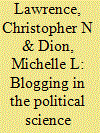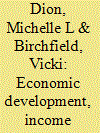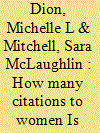| Srl | Item |
| 1 |
ID:
096220


|
|
|
|
|
| Publication |
2010.
|
| Summary/Abstract |
Weblogs (or blogs), as a form of communication on the Internet, have recently risen in prominence but may be poorly understood by both faculty and students. This article explains how blogs differ from other online communication tools and how political science faculty can make use of blogs in their classes. The focus is on using blogs as part of class assignments to reinforce important skills, including critical thinking, political engagement, and essay writing. We also discuss existing academic and professional blogs that may be models for student blogging in political science.
|
|
|
|
|
|
|
|
|
|
|
|
|
|
|
|
| 2 |
ID:
096687


|
|
|
|
|
| Publication |
2010.
|
| Summary/Abstract |
Adopting a cross-regional and global perspective, this article critically evaluates one of the core assertions of political economy approaches to welfare-that support for redistribution is inversely related to income. We hypothesize that economic self-interest gives way to more uniform support for redistribution in the interest of ensuring that basic or relative needs are met in less developed and highly unequal societies. To test this hypothesis, we analyze individual-level surveys combined with country-level indicators for more than 50 countries between 1984 and 2004. Our analysis shows that individual-level income does not systematically explain support for redistribution in countries with low levels of economic development or high levels of income inequality. These findings challenge the universality of the assumption of economic self-interest in shaping preferences for redistribution that has been so pervasive in the literature.
|
|
|
|
|
|
|
|
|
|
|
|
|
|
|
|
| 3 |
ID:
171287


|
|
|
|
|
| Summary/Abstract |
Recent studies identified gendered citation gaps in political science journal articles, with male scholars being less likely to cite work by female scholars in comparison to their female peers. Although journal editors, editorial boards, and political scientists are becoming more aware of implicit biases and adopting strategies to remedy them, we know less about the proper baselines for citations in subfields and research areas of political science. Without information about how many women should be cited in a research field, it is difficult to know whether the distribution is biased. Using the gender distribution of membership in professional political science organizations and article authors in 38 political science journals, we provide scholars with suggested minimum baselines for gender representation in citations. We also show that women represent a larger share of organization members than the authors in sponsoring organizations’ journals.
|
|
|
|
|
|
|
|
|
|
|
|
|
|
|
|